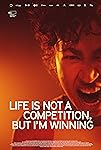Eye For Film >> Movies >> Life Is Not A Competition, But I'm Winning (2023) Film Review
Life Is Not A Competition, But I'm Winning
Reviewed by: Amber Wilkinson

Given that athletics is all about representing - your prowess, your team, your country - it’s ironic how often participants have found themselves erased from its history, an idea Julia Fuhr Mann’s ambitious first feature explores. Using a variety of techniques, including an essay structure and the insertion of modern-day athletes into archive footage, Mann suggests that excelling has always been fine for white men, but if you happen to be an exceptional woman, Black or transgender then nobody wants to put you on a pedestal or podium.
Noting the bias that has long existed by referencing Olympic Games founder Baron Pierre de Coubertin, who once declared “female athletes act against the law of nature”, Mann highlights key moments of sporting history that have been rewritten. The documentarian comes at the argument robustly and with invention. They also take a team approach to the material, using a group of participants as a collective and transporting them back in time to offer a sort of spiritual support to the athlete in question.
Among the cases highlighted are that of Lina Radke, the German athlete who won the first women’s 800m held at the Olympics. The race was controversial from the outset, with many believing it would all be too much for “the weaker sex”. Despite Radke having no problems with going the distance, another athlete collapsed over the line. This, confirming the previous bias, then became the story, denying Radke even her podium moment. In an indication of just how insidious these sorts of things can be, Mann also notes that, as a result, the women’s race was struck from the Games and would not be given another shot for 32 years.
The fickle nature of fame is also put in the spotlight by the case of Stella Walsh. An outstanding US athlete from the 1930s, news reports at the time marvelled at the fact she was “almost like a man”. When she died in circumstances that required an autopsy, however, it was discovered she had no uterus. Suddenly, the celebrated star became posthumously problematic and, Mann suggests, quietly erased from the record books.
The list of these disservices goes on. Mann’s film, though rooted in well researched history, is concerned with the far from level playing field in the present. Some of the contributors talk about the pressure to “hyper-feminise”, while others note the way society has groomed female athletes to line up behind the men at starting tape. Among the film’s most provocative ideas is that of excelling.
Swimmer Michael Phelps is celebrated for being, in essence, exceptional in male terms. Women, however, who are deemed to be “exceptional”, due to raised levels of testosterone, for example, face being forced into medical intervention to reduce their edge. The documentary asserts that this checking of hormone levels isn’t routine but only happens when someone stands out. The appalling potential of this is brought home by intersex Ugandan runner Annet Negesa, who was more or less conned into an operation that brought her elite career to a halt.
Although a little skewed in terms of its narration to first-person testimony balance, this is a thoughtful and well argued film that suggests rather than policing athletes by restricting them, expanding the boundaries of classification would allow everyone to stay in the running.
Reviewed on: 21 Oct 2023

















